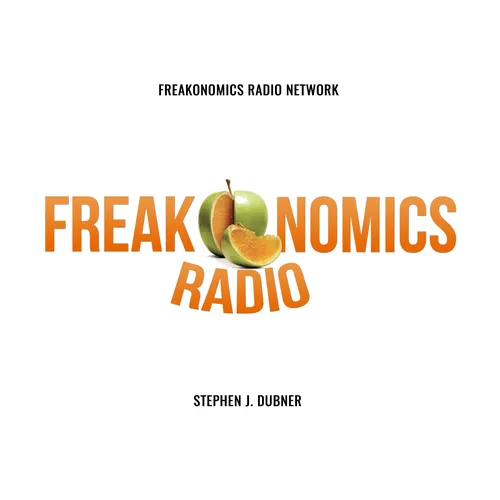
Freakonomics Radio
Freakonomics co-author Stephen J. Dubner uncovers the hidden side of everything. Why is it safer to fly in an airplane than drive a car? How do we decide whom to marry? Why is the media so full of bad news? Also: things you never knew you wanted to know about wolves, bananas, pollution, search engines, and the quirks of human behavior.
To get every show in the Freakonomics Radio Network without ads and a monthly bonus episode of Freakonomics Radio, start a free trial for SiriusXM Podcasts+ on Apple Podcasts or by visiting siriusxm.com/podcastsplus.
- Update frequency
- every 5 days
- Average duration
- 41 minutes
- Episodes
- 857
- Years Active
- 2010 - 2025

195. How Efficient Is Energy Efficiency?
It's a centerpiece of U.S. climate policy and a sacred cow among environmentalists. Does it work?

194. How Safe Is Your Job?
Economists preach the gospel of "creative destruction," whereby new industries -- and jobs -- replace the old ones. But has creative destruction become too destructive?

193. Someone Else’s Acid Trip
As Kevin Kelly tells it, the hippie revolution and the computer revolution are nearly one and the same.

192. That’s a Great Question!
Verbal tic or strategic rejoinder? Whatever the case: it’s rare to come across an interview these days where at least one question isn’t a “great” one.

191. Why Doesn’t Everyone Get the Flu Vaccine?
Influenza kills, but you’d never know it by how few of us get the vaccine.

What’s the “Best” Exercise? (Rebroadcast)
Most people blame lack of time for being out of shape. So maybe the solution is to exercise more efficiently.

What’s More Dangerous: Marijuana or Alcohol? (Rebroadcast)
Imagine that both substances were undiscovered until today. How would we think about their relative risks?

190. Time to Take Back the Toilet
Public bathrooms are noisy, poorly designed, and often nonexistent. What to do?

The Troubled Cremation of Stevie the Cat (Rebroadcast)
We spend billions on our pets, and one of the fastest-growing costs is pet "aftercare." But are those cremated remains you got back really from your pet?

189. How to Fix a Broken High Schooler, in Four Easy Steps
Okay, maybe the steps aren’t so easy. But a program run out of a Toronto housing project has had great success in turning around kids who were headed for trouble.

188. Is America’s Education Problem Really Just a Teacher Problem?
If U.S. schoolteachers are indeed “just a little bit below average,” it’s not really their fault. So what should be done about it?

187. The Man Who Would Be Everything
Boris Johnson -- mayor of London, biographer of Churchill, cheese-box painter and tennis-racket collector -- answers our FREAK-quently Asked Questions.

186. Why Do People Keep Having Children?
Even a brutal natural disaster doesn’t diminish our appetite for procreating. This surely means we’re heading toward massive overpopulation, right? Probably not.

185. Should the U.S. Merge With Mexico?
Corporations around the world are consolidating like never before. If it’s good enough for companies, why not countries? Welcome to Amexico!

184. What Can Vampires Teach Us About Economics?
A lot! “The Economics of the Undead” is a book about dating strategy, job creation, and whether there should be a legal market for blood.

183. “Tell Me Something I Don’t Know”
The debut of a live game show from Freakonomics Radio, with judges Malcolm Gladwell, Ana Gasteyer, and David Paterson.

182. How Can Tiny Norway Afford to Buy So Many Teslas?
The Norwegian government parleys massive oil wealth into huge subsidies for electric cars. Is that carbon laundering or just pragmatic environmentalism?

How to Raise Money Without Killing a Kitten (Rebroadcast)
The science of what works -- and doesn't work -- in fund-raising

181. Fixing the World, Bang-for-the-Buck Edition
A team of economists has been running the numbers on the U.N.'s development goals. They have a different view of how those billions of dollars should be spent.

180. Fitness Apartheid
Markets are hardly perfect, but the results can be ugly when you try to subvert them.